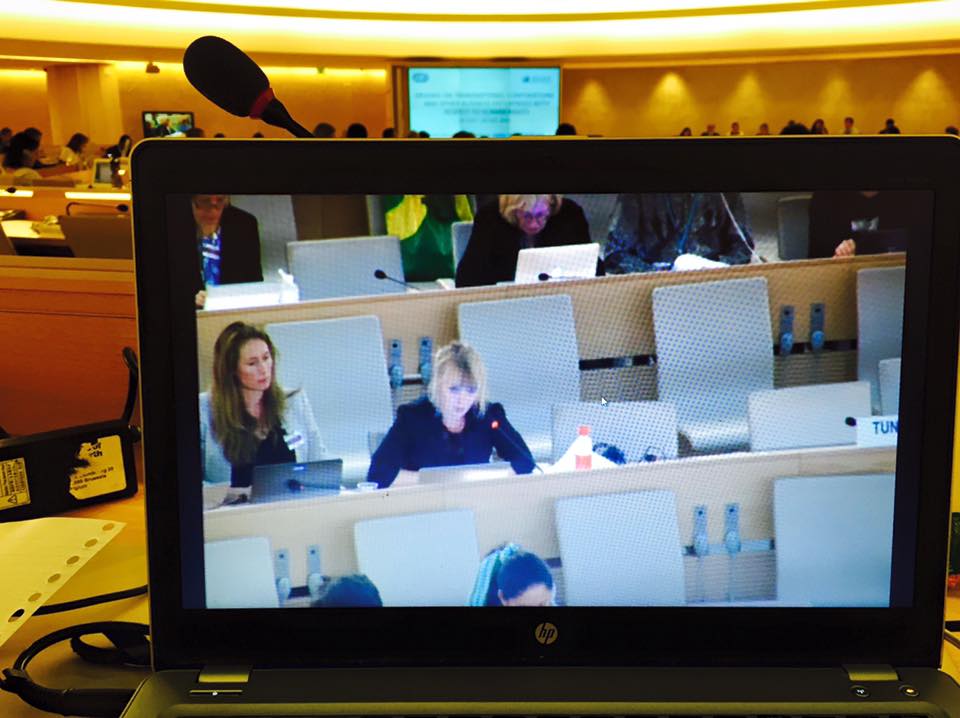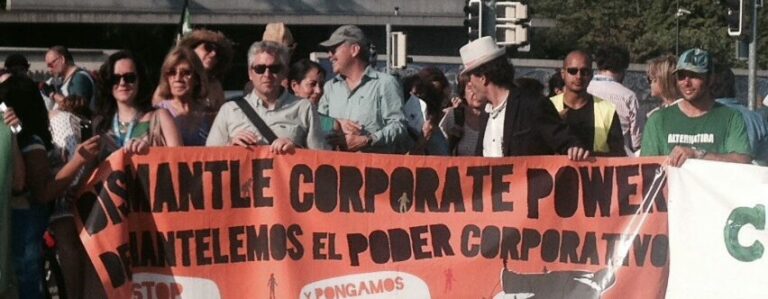
Reflections on the first round of negotiations on a binding instrument on business and human rights
From 6-10 July, the first session of discussions took place within the United Nations Intergovernmental Working Group (IGWG) towards a treaty on human rights and transnational corporations and other business enterprises. Civil society organisations (CSOs) from all over the world – including SOMO – contributed with a wealth of proposals and thorough analyses of the urgent need for an international, legally binding instrument to prevent business-related human rights abuses and to provide justice and remedy for affected people.
SOMO was joined in Geneva by other members of the newly-formed Treaty Alliance, including Friends of the Earth , the European Coalition for Corporate Justice (ECCJ), International Federation for Human Rights (FIDH), organisations supporting the Dismantle Corporate Power campaign and many others.
The most contentious issue discussed during this first session was the scope of the future instrument: should it focus on transnational corporations (TNCs), or should it cover all enterprises? The divide between member states was apparent from the opening of the session onwards, as the EU made the second option a condition for its participation in the process. Even though many CSOs agree that the instrument should ideally cover all enterprises to avoid loopholes, they unanimously condemned the unconstructive EU attitude. They made this public on Twitter addressing @EU_UNGeneva and using #stopcorporateabuse.
While this Twitter storm may have stopped the EU from actively derailing the proceedings further, the EU and its member states were absent from the discussions from Tuesday afternoon onwards.
Substantive discussions on scope of the binding #bizhumanrights(opens in new window) instrument ongoing, EU_UNGeneva and EU MS not present #StopCorporateAbuse(opens in new window)
— Mariëtte v Huijstee (@Mariette_v_H) July 7, 2015(opens in new window)
A hybrid option
An option (opens in new window) to bridge the divide – developed by Dr. Surya Deva, associate professor at the City University of Hong Kong – was brought into the discussion by SOMO on behalf of CIDSE, Friends of the Earth Europe, Global Policy Forum, IBFAN and IBFAN-GIFA and Brot für die Welt. Since discussions on the scope of the future instrument are far from settled, this so-called ‘hybrid option’ deserves further attention. SOMO plans to discuss and develop this option further over the coming months.
Contributions by SOMO
SOMO researchers Anne Schuit and Mariëtte van Huijstee made a number of oral submissions during different panel sessions. For those interested, these submissions can be viewed online:
– Oral submission(opens in new window)
by Mariëtte van Huijstee in Panel Discussion on Coverage of the Instrument: TNCs and other Business Enterprises: Concepts and legal nature in international law (7 July 2015 – Second: 2:40:00)
– Oral submission(opens in new window)
by Mariëtte van Huijstee in Panel Discussion on Legal Liability of TNCs and other Business Enterprises: What standard for corporate legal liability and for which conducts? (9 July 2015 – Second: 1:22:55)
– Oral submission (opens in new window)
by Anne Schuit in Panel Discussion on Access to Remedy, including international judicial cooperation, with respect to human rights violations by TNCs and other business enterprises (9 July 2015 – Second: 1:35:55)
Further reading
Here is a summary(opens in new window) of the activities on Twitter around #OccupyUNSquare. For those interested, the full proceedings of the first session can be watched here(opens in new window) , while numerous blogs and reflections on the process are available online, including the Treaty Alliance(opens in new window) , ECCJ(opens in new window) and Business and Human Rights Resource Centre(opens in new window) .
Partners
Related content
-
 Exciting times at the UN as negotiations on a binding treaty for business and human rights kick offPosted in category:NewsPublished on:
Exciting times at the UN as negotiations on a binding treaty for business and human rights kick offPosted in category:NewsPublished on: -
 Dutch State accused of failing to prevent genocidePosted in category:Case
Dutch State accused of failing to prevent genocidePosted in category:Case Lydia de LeeuwPublished on:
Lydia de LeeuwPublished on: -

